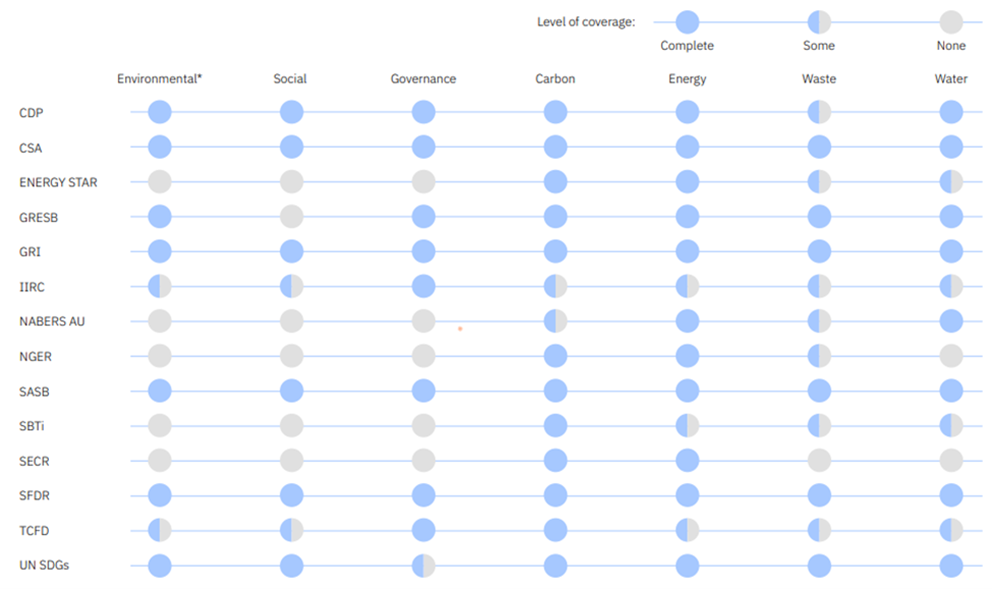Top takeaways:
- ESG reporting is the voluntary disclosure of information regarding the environmental, social, and governance impacts of an organization beyond traditional financial measures. It considers an organization’s sustainability impacts, risks, and opportunities.
- Interest in ESG reporting continues to grow and is expected to increase in relevance for investors, customers, and other stakeholders.
- There are several different standards for ESG reporting. Current ESG data is difficult to audit and does not align with financial statements. However, there is a movement towards a global standard to address differences and improve the comparability of ESG data.
With growing interest from investors, customers, and other stakeholders in understanding corporate sustainability strategies and impacts, interest in ESG reporting is also growing. ESG reporting is the voluntary disclosure of information regarding the environmental, social, and governance impacts of an organization beyond traditional financial measures. It considers an organization’s sustainability impacts, risks, and opportunities.
ESG reporting has several benefits and creates value for organizations in different ways. It builds reputation for good stewardship, encourages investment thereby increasing growth prospects, increases efficiency, reduces the risk profile, and improves corporate culture and employee engagement, leading to improvements in the financial performance of organizations.
At the start of 2020, global sustainable investments totaled $35.3 trillion, which is equivalent to around a third of assets under management in major economies, according to a report published by the Global Sustainable Investment Alliance [1]. There is increased stakeholder interest in ESG reporting and demand for more frequent and detailed disclosures.
Currently, there are several different standards for ESG reporting. Current ESG data is difficult to audit and does not align with financial statements. However, there is a movement towards a global standard to address differences and improve the comparability of ESG data. In 2021 at COP 26 (the United Nations climate change conference) in Scotland, a new organization called the International Sustainability Standards Board (ISSB) was created. The ISSB will develop a common ESG reporting standard that will be as rigorous as financial reporting standards. This global standard will be critical to moving forward on climate change, enabling organizations to better understand their physical risks such as flooding and extreme heat, as well as transition risks associated with a shift to a net-zero economy. There is also work underway to localize sustainability reporting standards to Canada through the Canadian Sustainability Standards Board (CSSB), which is currently in early stages of development with plans to launch in April 2023 [2].
Reporting Standards and Frameworks
Sustainability frameworks provide guidance on how information is prepared while sustainability standards provide specific, detailed reporting requirements including metrics that make frameworks actionable. There are several ESG frameworks and standards with their own set of requirements. Several factors should be considered when deciding the appropriate ESG reporting framework for your organization including stakeholder expectations, sector, geography, potential for impact, and the key ESG performance metrics [3]. Widely used frameworks and standards are listed below, with Figure 1 below illustrating their focus areas.
UN Sustainable Development Goals
The UN General Assembly adopted 17 Sustainable Development Goals (SDGs) in 2015 as part of its 2030 Agenda for Sustainable Development. The SDGs have been incorporated in many ESG assessment frameworks. Learn more: https://sdgs.un.org/goals
Global Reporting Initiative (GRI) is an international independent standards organization that has worked with multiple stakeholders to develop the GRI Standards. These are regarded as the most widely used standards for ESG reporting globally and support both comprehensive reports and selected disclosures. Learn more: https://www.globalreporting.org/
Task Force on Climate-related Financial Disclosures
The G20 requested the Financial Stability Board (FSB) to create the Task Force on Climate-related Financial Disclosures (TCFD) to develop recommendations on climate-related financial disclosures to help organizations improve and increase their climate-related financial reporting. The final recommendations were published in June 2017 and are intended to facilitate the development of voluntary and consistent climate-related financial disclosures. Learn more: https://www.fsb-tcfd.org/
CDP Global (formerly the Carbon Disclosure Project) is an international non-profit organization that has developed a global environmental impact disclosure framework that collects standardized information on climate change and the use of natural resources to help measure and manage risks. Learn more: https://www.cdp.net/en/climate
Greenhouse Gas (GHG) Protocol provides standards to organizations to measure and manage GHG emissions and is the world’s most widely used greenhouse gas accounting standard. Learn more: https://ghgprotocol.org/
Science Based Targets initiative (SBTi) enables organizations to set science-based emissions reduction targets to meet the goals of the Paris Agreement, limiting global warming to 1.5°C above pre-industrial levels. Technical guidance and independent assessment and validation of targets is offered through the initiative. The SBTi is a partnership between the CDP, the United Nations Global Compact, World Resources Institute (WRI) and the World Wide Fund for Nature (WWF). Learn more: https://sciencebasedtargets.org/
International Integrated Reporting Council (IIRC) is a global coalition of stakeholders that has established the Integrated Reporting Framework, which is used to connect financial statements and sustainability-related financial disclosures. The Integrated Reporting Framework is maintained by the International Financial Reporting Standards Foundation or IFRS Foundation, a global nonprofit. The IFRS Foundation’s International Accounting Standards Board (IASB) and International Sustainability Standards Board (ISSB) are jointly responsible for the Integrated Reporting Framework. Learn more: https://www.integratedreporting.org/

Bottom Line
ESG disclosure and reporting will continue to increase in its importance and relevance over the years ahead. Many organizations that have not previously had to report on ESG metrics may soon find themselves requested provide this information by investors or clients. Companies that do not report on ESG metrics may soon find themselves at a competitive disadvantage compared to organizations that have consistent annual ESG reports. There are several different ESG reporting frameworks with different levels of coverage, detail, and effort involved. Organizations must understand their climate risks as well as the interests of their internal and external stakeholders to identify which framework(s) are best suited for them.
Partners in Project Green’s Building a Climate Resilient Business Resource Kit provides a foundation in the basics of current climate science, the impacts of climate change on businesses, and mitigation and adaptation strategies. Please explore these resources and connect with us to advance your organization’s climate resiliency.
To learn about the impacts of climate change on business, check out:
- Impact: Human Health
- Impact: Buildings and Infrastructure
- Impact: Agriculture and Food Security
- Impact: Supply Chain
- Impact: Financial and Regulatory
[1] Kiderlin, S. 2021. Sustainable investments now total $35.3 trillion, roughly a third of global assets unders management, report shows. Market Insider. Accessed September 6, 2022. URL: https://markets.businessinsider.com/news/stocks/global-sustainable-investment-alliance-report-esg-assets-responsible-investing-2021-7
[2] Financial Reporting & Assurance Standards Canada (FRAS Canada). Canadian Sustainability Standards Board. Accessed October 26, 2022. URL: https://www.frascanada.ca/en/cssb
[3] IBM Corporation. ESG reporting frameworks, Metric coverage, June 2022. Accessed September 1, 2022. URL: https://www.ibm.com/downloads/cas/WGPBJP9O .

